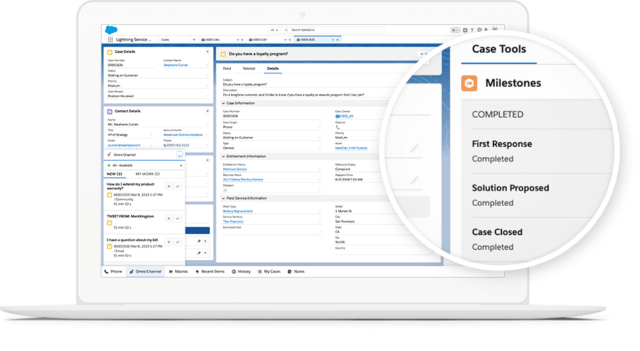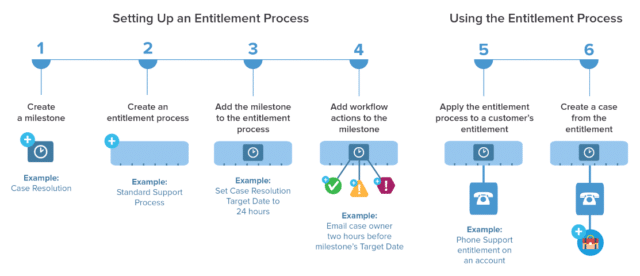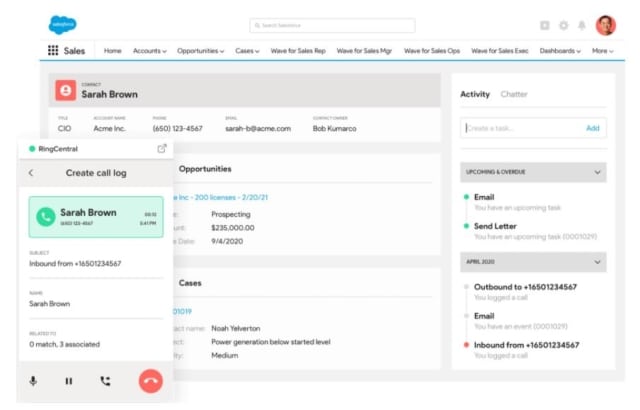All companies need to stay connected. Now that most are using an omnichannel sales approach and connecting with customers via social media, chatbots, and live messaging apps, it’s important to ensure that all data is stored in one safe and secure knowledge base.
The modern business world means that more companies than ever are using cloud computing. A cloud service provides better customer satisfaction and employee management while ensuring that every member of the team can access the information they need.
Companies using a customer relationship management (CRM) solution like Salesforce might be aware that the Service Cloud and Sales Cloud are both applications available on the Salesforce platform. Let’s look into what a Service Cloud is in a little more detail, and determine exactly what it is and how it might benefit your company.

What is a cloud service?
Firstly, it’s important to establish the meaning of a cloud service. The term “cloud service” covers a huge scope of services over the internet. Essentially, the term simply means any kind of service that users connect to through the internet as opposed to those available on a company’s own server.
A cloud service can be used for a number of purposes, including data storage, software, web-based email services, hosted office suites, and technical support services.
Most business owners find that cloud services increase functionality and streamline their workflow. They can also save money because:
- There’s no need for expensive equipment
- It doesn’t require hardware installation
- Employees can work from anywhere and even use their own device
The purpose of a cloud service is to provide easy, affordable access to applications and resources to everyone; whether they’re based in the UK or a remote island in the middle of the Atlantic. A cloud service ensures that anyone with an internet connection and a device such as a laptop, phone, or computer can access the information they need.
One example of a cloud service provider is Salesforce. Salesforce is a CRM used by many different businesses. As such, it offers the Service Cloud.
Built on its customer success platform, the Service Cloud exists to help companies communicate better with customers and provide a more streamlined customer experience. It does this by:
- Giving you a 360-degree view of your customers
- Automating service processes
- Streamlining workflows
- Enabling you to connect one-to-one with every customer across multiple channels
The service cloud gives your agents the tools they need to support your customers. It also enables you to create a self-service community that allows customers to tap into the best information about your product.

Benefits of service cloud for…
There are a number of benefits to Salesforce’s Service Cloud. These apply to both customers and companies. The customer is always right, so let’s start with them first.
Customers
Service Cloud benefits customers in a number of different ways. For example, it provides an additional level of customer support. This is because customers can be connected to customer service agents in a faster, more intelligent manner. This improves the customer experience as they reach the right live agent in the call centre without wasting time sitting on hold or bouncing between customer service representatives.
Service Cloud helps communication for customers, too. Customer interactions can take place across a variety of different channels including social media, webchat, and mobile messaging. And, telephony is still an option for those who find it the preferable way to communicate.
As such, Service Cloud creates more flexibility for customers and adapts to their needs. Customers can pick how they communicate with a customer service representative without having to constantly explain who they are and what their situation is. It’s ideal for a customer on the move, one who has a hearing difficulty, or who speaks a different language.
Being able to speak to a customer service agent in real-time is essential in improving customer relationships. The entitlements feature on Service Cloud helps to ensure that customers needs are always met.

Companies
When the customer benefits, the company does too. Service Cloud has many benefits for companies.
For one thing, it makes flexible working much easier. Employees can access information from any workspace, whether that’s the office, their living room or at a client meeting. And, when your employees are trusted to work from anywhere, productivity increases alongside employee attrition.
Service Cloud also improves the functionality of a business. It makes case management more efficient, and escalation becomes easier. Your service teams have the tools to complete cases quicker, meaning that customers’ sales, queries or complaints are resolved efficiently – every time.
Salesforce Service Cloud creates better agent-customer connections, increasing the likelihood of a long-lasting relationship. When an agent understands exactly what their customer wants and has a 360-degree view of their needs, they can handle queries in the best possible manner. So, streamline your field service by understanding your customers.
Key features and benefits
There are a number of high-quality features included with Service Cloud, alongside many great add-ons. In order to resolve customer issues quickly and efficiently and help communication reach the next level, companies using Service Cloud benefit from the following:
- CTI integration: allow agents to make calls from a softphone directly in Salesforce without installing CTI adapters on their machines.
- allow agents to make calls from a softphone directly in Salesforce without installing CTI adapters on their machines.
- Omnichannel routing: ensure the most important work items are pushed to agents first by routing work items by the priority of the queue that they’re assigned to.
- Service console: a customisable app used to track and resolve cases that meet all your business’s service needs. These customisations mean your service can be completely personalised to your business needs.
- Self-service portal: connecting customers to account information, knowledge articles and step-by-step instructions; this helps them to find the answers they need without contacting you first.
- Templates: agents benefit from macros, keyboard shortcuts, and ready-to-use templates, making them work faster and more efficiently.
- Email-to-case: automatically creating cases and auto-populating case fields when customers send messages to specified email addresses.
- Service Cloud voice: enabling users to automate service processes, streamline workflows and find key articles, topics, and experts to support customer service agents.
- Lightning service console: customize to meet your employees’ case management needs and allow them to access all things case-related from one screen.
- Service analytics: make it easy for service managers and agents to use data to drive the success of your service business and deliver a more personalised service.
- Visual SLA timelines: ensure that your client gets the service they require by having a clear image of what needs to be done and when.
- Marketing cloud: create and manage marketing relationships and campaigns with customers. This covers email automation, channel integration, SMS marketing, and real-time relevant communications.

Sales Cloud vs. Service Cloud
In Salesforce, there are two different options: Sales Cloud and Service Cloud. Here’s the main difference:
- Sales Cloud: helps businesses manage sales activity
- Service Cloud: helps businesses maintain better customer communication
Sales Cloud aims to get your sales team working faster and smarter, reducing the hours spent on administration tasks and increasing the hours spent talking to customers. As such, Sales Cloud helps you manage the following for your company, all in one place:
- Contacts
- Accounts
- Leads
- Opportunities
- Quotes
- Deals
However, you might notice that the above features focus entirely on making sales. They don’t help your agents communicate better or streamline the way agents are paired with customers.
Because of this, Service Cloud is considered the more sophisticated choice, especially for businesses looking to form long-lasting relationships with customers. While Sales Cloud might help you to make product sales, Service Cloud takes your business to the next level in terms of long-term growth.
Salesforce’s Service Cloud boasts additional functionalities to Sales Cloud and is best for businesses looking for automation services, omnichannel routing to match a customer with the right live agent, and additional productivity tools. Offering the features listed above is better at ensuring customers get exactly what they need.
Which Service Cloud Platform can integrate with RingCentral

RingCentral integrates seamlessly with Salesforce. The following integrations that we offer ensure that Salesforce and RingCentral work side by side to create the best possible user experience:
- Click-to-call: Make calls directly from within Salesforce by clicking on any contact, saving time and completely eliminating misdials. An integrated presence lets your team know when you’re busy.
- Instant screen pop: Incoming calls are matched with case and customer records and a 360-degree view of the caller is displayed. With access to the right information at the right time, agents are better prepared to have an insightful conversation and can effectively answer questions and escalate inquiries.
- Real-time call logs: Auto-log notes during or after your calls. Offline call logging makes it easy to log notes on missed calls.
- Updated UI: Drive higher productivity with enhanced call management, coloured status alerts, and powerful search.
- Schedule meetings: Seamlessly schedule RingCentral Video meetings from Salesforce.
- Integrates with the Salesforce app: Reach out to customers on the fly by calling or texting right from the Account, Contact, or Lead tab.
- Analytics: Customise your dashboard with the most relevant information for your business, and easily detect performance inconsistencies.
- Access from anywhere: Connect on both Windows and Mac using any popular browser.
At RingCentral, we want your customers to have the very best experience. Our integrations with the Salesforce Service Cloud ensure that no customer is left behind. We’re here to help your employees work efficiently from any location so your customers can contact them no matter what.
For information on pricing, get in contact today. You can also check out our free demo.
Originally published Mar 15, 2021, updated Apr 15, 2021

